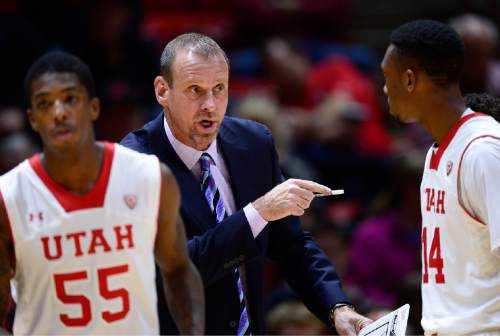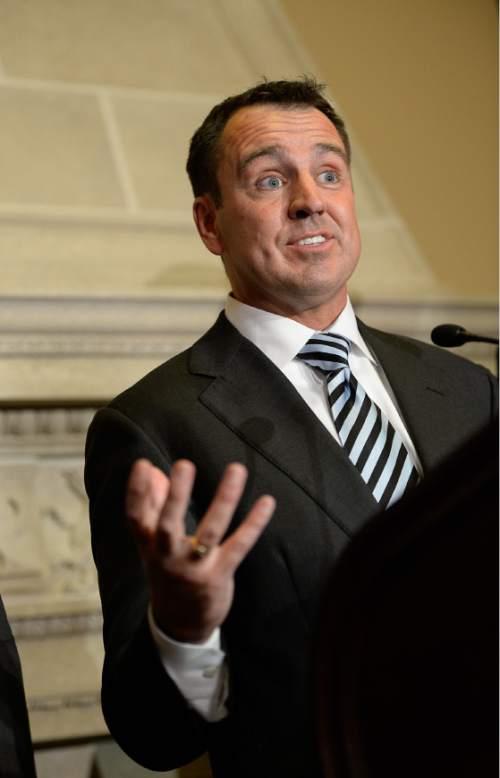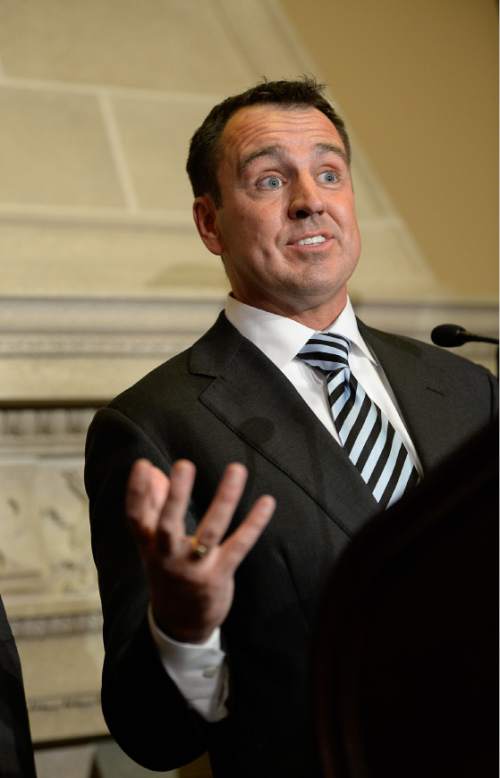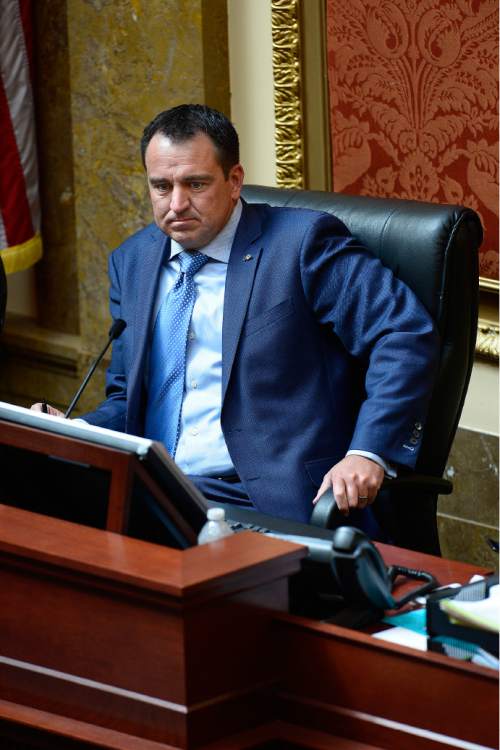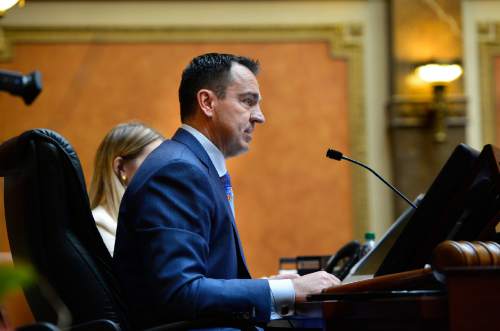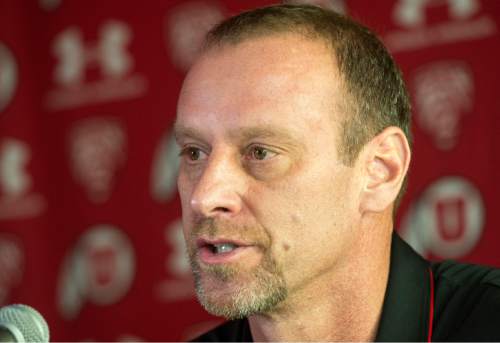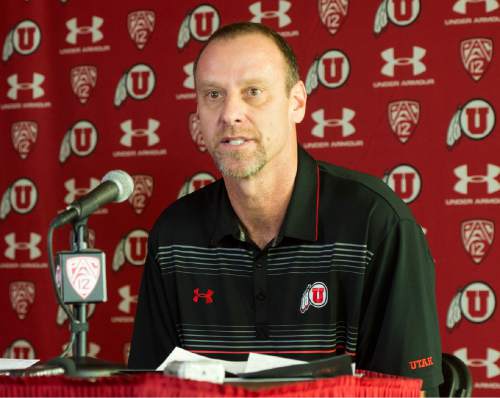This is an archived article that was published on sltrib.com in 2016, and information in the article may be outdated. It is provided only for personal research purposes and may not be reprinted.
The University of Utah roiled fans across the state — and in the Capitol — when it yanked Brigham Young University from next season's basketball schedule. Now, lawmakers are taking the Utes to task with a sweeping probe of the college's sports department.
The "efficiency and effectiveness" review is the first-ever state audit of a single athletic office. The breadth of the new request distinguishes it from other more routine reports, including a brief state financial analysis of all eight public colleges each year.
A four-member panel approved the new report without discussion in the final moments of the Feb. 1 public Legislative Audit Subcommittee meeting — less than a month after Utah shelved the state's signature rivalry.
Some lawmakers say more information only can help, but are cautious not to venture too far out of their own arena and onto the hardwood.
The group includes Senate Minority Leader Gene Davis, who voted in favor of the audit.
"I know how much rivalry there is," Davis said, but "as far as trying to force one school and another school to play each other, I've got more important things."
Still, sports series deserve scrutiny, said House Speaker Greg Hughes, because they bind communities and represent Utah on a national stage.
The U.'s decision to upend a century of tradition illuminates a series "of decisions over time that make you wonder. It's a cumulative effect," said the Draper Republican, an alumnus and fan of the Provo private school.
Others were more pointed.
"The exclamation point needs to be, 'If you ever, athletic department, feel like you have taken over [the rest of the school]," Rep. Dan McCay warned the U. in a Feb. 4 higher education budget meeting, "we'll get rid of you.' "
"I'd hate for athletic programs to be a distraction like they have been this last year," the Riverton Republican told U. President David Pershing, "especially most recently over some of the antics of your athletic director, as well as your basketball coach."
"I know," replied a somber Pershing.
The Utah-BYU split is not the sole force behind the audit of Utah's athletic department.
The Salt Lake City-based Power Five school reaps much more sports revenue than its Utah neighbors. It took in $56 million in 2014, spending $50 million. Utah State University took in $25 million; Weber State University received $13 million, according to NCAA figures.
In 2010 and 2011, the U. allowed its agreements with USU — which began playing U. teams in 1892 — and Weber to expire. Hughes believes the smaller schools and their surrounding towns have hemorrhaged returns on contract money and ticket sales.
"Understanding how those dollars flow becomes important when you're making decisions," Hughes said. "In that vein, that audit is going to get some good information so that good decisions can be made."
U. head basketball coach Larry Krystkowiak announced the BYU hiatus Jan. 6. He said the goal was to temper the emotions that had boiled over when BYU's Nick Emery struck his guard Brandon Taylor in the final minutes of the Utes' 83-75 Dec. 2 victory. Krystkowiak stormed the court and Emery was ejected.
The coach's stated "cool-down" measure set Utahns' blood boiling. Scores of Ute and Cougar fans wrote their legislators demanding a new law to block Krystkowiak's action. Thousands slammed or defended the move on social media. Dozens emailed Pershing.
"Play the game," tweeted Utah's governor.
Even BYU's athletic director, Tom Holmoe, weighed in publicly. Canceling the series, he posted on Twitter, "is RIDICULOUS."
Hughes met with Pershing following the announcement to relay constituents' concerns, he said. So did Sen. Stephen Urquhart, R-St. George.
The Utah Legislature would not be the first to write a tipoff into law — in 1983, Kentucky passed a legislative measure requiring the universities of Louisville and Kentucky to play each other in the regular season, ending more than a half-century of distance between the foes. But Utah's body of 104 representatives has "no interest," Urquhart said, in legislating basketball season.
Hughes agreed. "I think I heard loud and clear" from colleagues, he said, "to butt out."
Senate President Wayne Niederhauser said that while the rivalry cancellation did put the Utes and college sports on the committee's radar, it did not incite the probe.
"I see the merits" of the series, the Sandy Republican said. "But I didn't want to get in the middle of that."
The USU alumnus and his colleagues last year gave $1.5 million to the Aggies to recruit athletes but have not moved to order a review tracing that money. This year, Weber sports are set to receive a similar boost to better compete for top recruits.
Committee members chose to first scrutinize the U. after realizing they had yet to review a school sports office. The U., the panel thought, "would be a good place to start," Niederhauser said.
"Our role is not to be concerned about why an audit is coming in, just to provide the information," said Utah Athletic Director Chris Hill. "When recommendations are made, it's our job to get better."
Hill says his department must be a round-the-clock "good representative of the university," and is committed to transparency.
The U.'s Pershing declined an interview. His school is "accustomed to audits," he said in a prepared statement, "and recognizes the opportunities for improvement" they produce.
His staff is preparing for the review.
Auditor manager Kade Minchey and two of his staffers met last week with U. athletics officials, he said, including Hill and Chief Administrative Officer John Nixon.
The team of three has received no further guidance following the Feb. 1 meeting and will take "some time" to home in on areas of investigation, Minchey said, which he expects will take until the end of the year.


